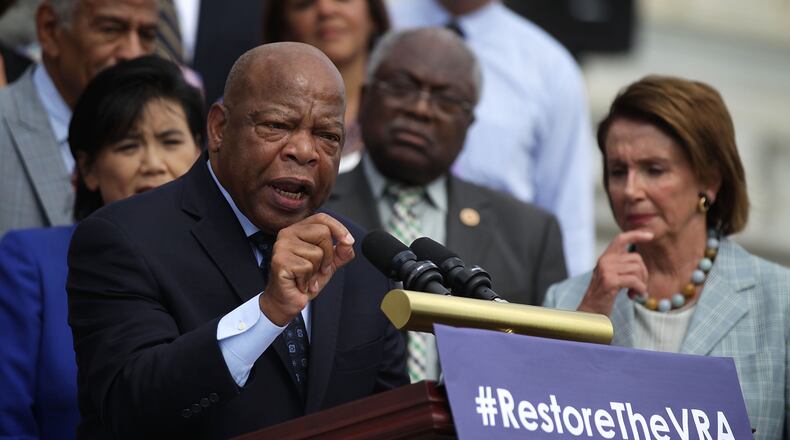The Democratic takeover of the U.S. House on Thursday will mean more than just an endless string of subpoenas for the Trump administration and subcommittee gavels for some Georgia lawmakers.
The party’s return to power could also shift the politics surrounding several issues of pressing interest to Georgia, including voting rights and election security. Here are some of the issues we’re watching in 2019:
Election Security, voting, gerrymandering
Incoming Gov. Brian Kemp and the new Legislature are likely to tackle a raft of issues related to voting and election security in the months ahead. Expect the Democrat-controlled U.S. House to also get involved in the debate. "No American should face hours-long lines, broken voting machines or rules rigged to keep their vote from being counted in our elections," Speaker-designate Nancy Pelosi and U.S. Rep. John Sarbanes, D-Md., wrote in an op-ed in the Washington Post shortly after the November elections.
H.R. 1, one of the first bills party leaders want to move this year, includes language seeking to make it easier for people to vote by instituting automatic voter registration and promoting online voter registration. It would outlaw partisan gerrymandering by giving independent commissions redistricting powers instead of state legislatures. To combat foreign meddling in U.S. elections, it would require the Director of National Intelligence to regularly check for foreign threats.
The House package is expected to be dead on arrival in the Republican-controlled Senate.
Voting Rights Act
House Democrats say another early priority will be restoring the portions of the 1965 Voting Rights Act that were struck down by the Supreme Court in 2013. In its 5-4 decision, the court ruled the formula that determined which jurisdictions were required to submit their voting laws for "pre-clearance" with the Department of Justice was outdated, and it threw out the standards that 16 states with a history of overt discrimination in voting practices – including Georgia – had long been required to follow. The justices did leave the door open for lawmakers to come up with a new formula, but the issue didn't get traction in the GOP-led Congress.
Democrats have long been eager to re-institute the scrapped sections of the law, a push that was hastened by voting controversies in Georgia, Florida and other states in last year's elections. McClatchy reported that Democratic leaders are eyeing potential field hearings in Georgia, Texas and other Southern states. Expect U.S. Rep. John Lewis, D-Atlanta, who attended President Lyndon Johnson's signing of the Voting Rights Act, to be central to any effort.
But the push won’t be without its critics. Any proposed changes will have to go through the Senate Judiciary Committee. U.S. Sen. Lindsey Graham, R-S.C, the panel’s incoming chairman, told McClatchy he wanted to keep elections in the hands of states, not the feds.
Gun control
Kemp bolstered his conservative credentials in the Republican gubernatorial primary by vowing to double down on red meat issues such as gun rights. Among his campaign promises was a sales-tax holiday for guns and ammunition.
The Democratic House, however, will be taking an entirely different approach to the debate. Many of the party's incoming freshman, including Marietta's Lucy McBath, were elected on staunch gun control platforms, and leaders have vowed to move long-stalled legislation tightening federal rules. An early priority is instituting universal background checks for gun sales. Other measures are expected to follow, but they are unlikely to be taken up in the Senate.
Equifax
An area that could pick up bipartisan support is data breach legislation, a direct response to the 2017 hack of the Atlanta-based credit reporting agency Equifax. Turf battles and industry pushback sapped Congress of its momentum in the year following the breach, but a recent report labeling the hack as "entirely preventable" has upped the pressure on lawmakers to act.
California Democrat Maxine Waters, the soon-to-be head of the House Financial Services Committee, has put legislation responding to the breach at the top of the agenda this year. There are several competing proposals in the public domain, but finding something that wins the support of both parties, industry groups and the Trump administration could be challenging.
Subpoena power
An incredibly powerful tool that comes with the House majority is subpoena power, and Democrats have indicated they won't focus exclusively on the Trump White House. U.S. Rep. Elijah Cummings, the incoming chairman of the House Oversight Committee, has said he's interested in calling Kemp to testify about his dual role as secretary of state and gubernatorial candidate last fall. Cummings also said he wanted to explore ballot access allegations involving Kansas and North Carolina.
Other Georgians could also find themselves in Cummings' cross-hairs. The Maryland Democrat sent more than four-dozen letters to various Trump administration offices last month, including to that of Agriculture Secretary Sonny Perdue. Among the issues he's asked about is the use of government-owned aircraft for personal travel, the use of private jets for official travel, and the cost to taxpayers -- a not-so-subtle response to the ethics scandal that ultimately forced former Georgia congressman Tom Price from President Donald Trump's cabinet. As far as we know, Perdue seems to prefer RVs to charter jets, but Democrats are eager to turn up the heat on senior officials whom they feel have been given a free pass under Republican leadership.
Read more of the AJC’s political cheat sheets:
About the Author
Keep Reading
The Latest
Featured





